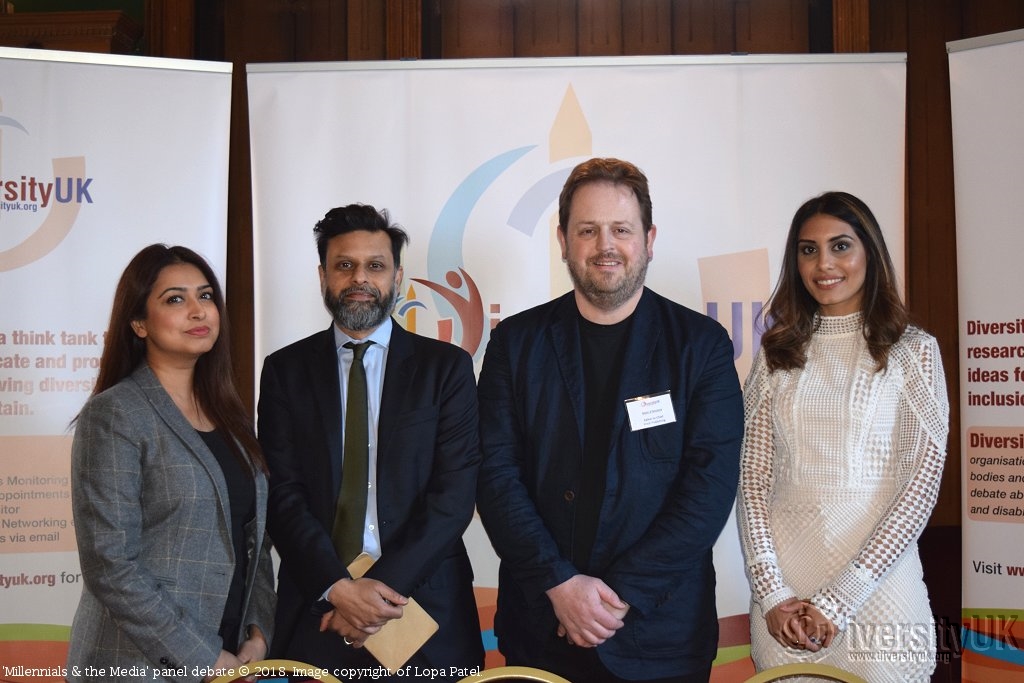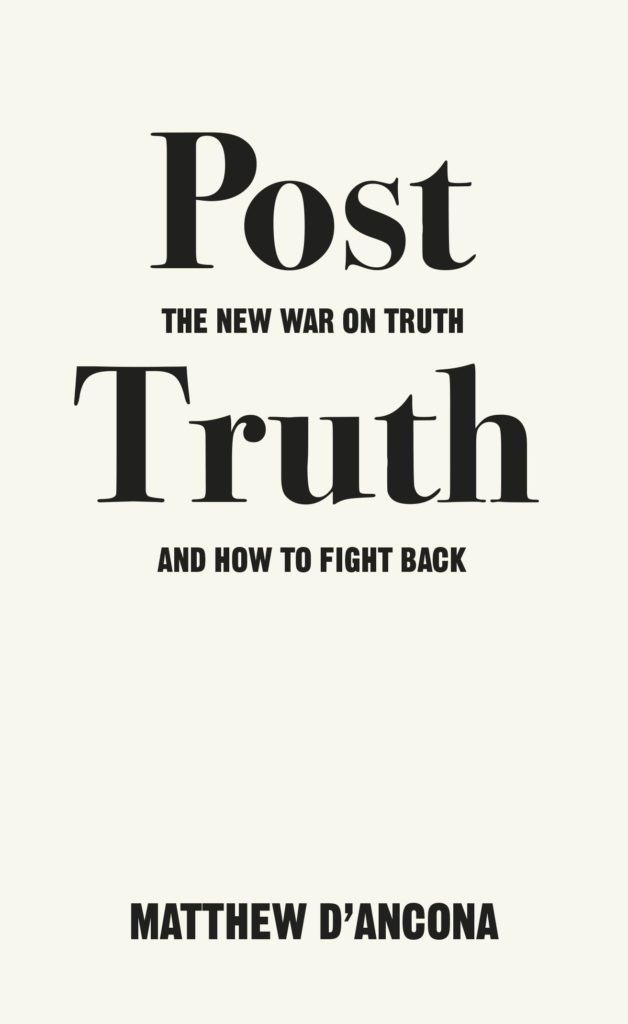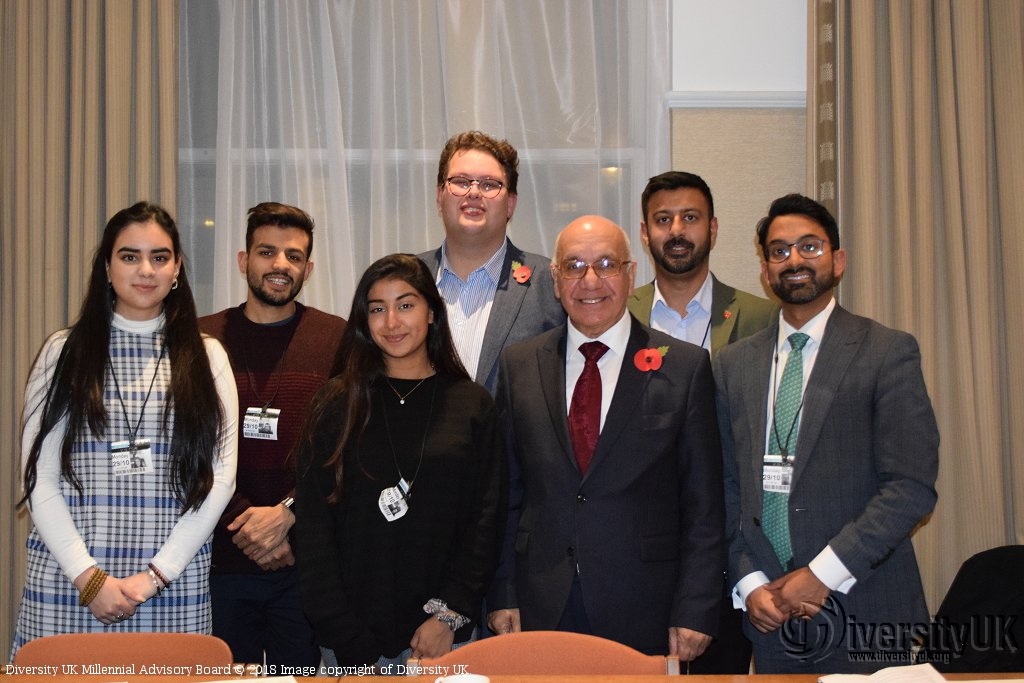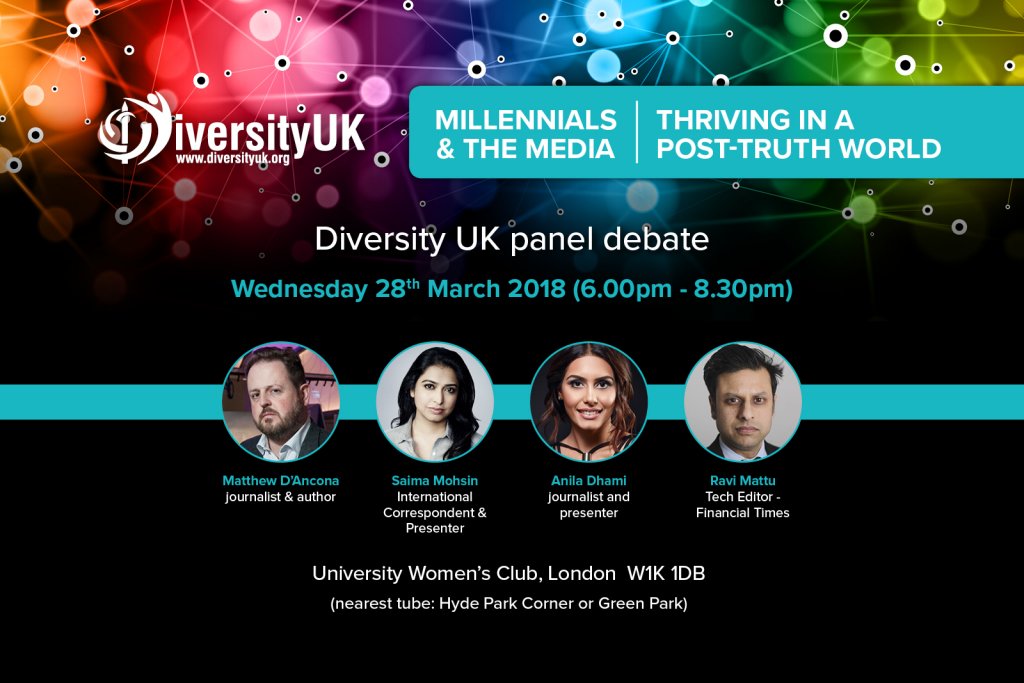Millennials are thriving in the post-truth world

Millennials are thriving in the post-truth world concluded an expert panel brought together by Diversity UK for a debate on the topic on Wednesday 28th March 2018. International correspondent and presenter Saima Mohsin moderated the panel comprising Matthew d’Ancona, journalist and author of ‘Post Truth: The New War on Truth and How to Fight Back’; Anila Dhami, journalist and presenter and Ravi Mattu, Technology, Media & Telecoms News Editor at the Financial Times.
Millennials, a term that generally refers to the generation of people born between the early 1980s and 1990s, are often described to have characteristics that are different from previous generations like the “Baby Boomers”. A 2012 study in the USA found Millennials to be "more civically and politically disengaged, more focused on materialistic values, and less concerned about helping the larger community than were GenX (born 1962-1981) and Baby Boomers (born 1946 to about 1961) at the same ages," according to USA Today. "The trend is more of an emphasis on extrinsic values such as money, fame, and image, and less emphasis on intrinsic values such as self-acceptance, group affiliation and community." The study was based on an analysis of two large databases of 9 million high school seniors or entering college students.
The millennial generation, often more digitally literate and tech savvy than previous generations are also thought be more liberal in their views and more susceptible to “fake news”. Trust in traditional media, politicians and civic organisations is at an all time low with the Brexit Referendum and the election of Donald Trump as President of the United States leading us to think that lies, hypocrisy and flattery have become the new “norm”. Scientists and academics too are suffering from an erosion in veracity on evidence-based methodology and logical thinking. The terms ‘alternative facts’ and ‘fake news’ have become common parlance and 'post truth' was the Oxford English Dictionary’s 2016 international word of the year, reflecting what it called a "highly-charged" political 12 months.
It seems difficult enough to survive in a “post truth” world let alone thrive in one. Yet, this is exactly what millennials must do to conquer the barrage of misinformation, rumour and hate speech to ensure that trust in our democratic rights, freedom and liberty is retained. Progress cannot be achieved when “objective facts are less influential in shaping public opinion than appeals to emotion and personal belief”, i.e a “post truth” world. The panel debate addressed issues about regulation, fact-checking and freedom of the speech; hate crime, racism and segregation and the impact of social media.
Post-truth is a viral concept that is not limited to the political sphere
“All is not lost by any means but the old patterns of media consumption have changed dramatically in the past 20 years,” said Matt d’Ancona. “Many of the new media issues have real world consequences. Post truth is a viral concept and is not something that is limited to the political sphere”, he added, citing the example of potential public health consequences as a result of current anti-vaccination campaigns based on unproven science.
We don’t want a Ministry of Truth!
“No technology in human history has been at the pace we have seen in the last 20 years so of course the current rules don’t fit the needs. It is hard for large democracies to keep up with the hectic pace. The worst possible outcome would be a populist reflex reaction against technology which leads to a “Ministry of Truth”. What we want is smart regulation, smart legislation, working with tech giants so we don’t crush the freedom of press or freedom of expression”, added Matt d’Ancona, who has recently become the Editor-in-Chief of Finch Publishing.
“Nothing is for free, you are the product so the reckoning will come from the onus being put in the hands of consumers to ask more questions about how their data will be used”, said Ravi Mattu, referring to the Cambridge Analytica case of 50 million Facebook users’ data being utilised for political campaigns without the users’ knowledge.
Brexit has created a real cultural identity crisis
“For me, Brexit was about a real cultural identity crisis”, said millennial Anila Dhami, “the 'Leave' campaign was emotional and the 'Remain' campaign was factual. People want radical change so rousing emotions in the populace is an important campaigning tool. Immigration was at the forefront and many people thought that immigration would be solved by Brexit. But really, in my view, it was people looking to get their identity back. Brexit has led to a lot of segregation and we need to create more initiatives to integrate people so that we can have a personal attachment to people rather than to technology. We need to re-establish the human connection.”
Communities thrive with multiculturalism
"We are in a multicultural society which is not likely to change any time soon. Communities thrive with multiculturalism and the sooner we accept that, the better it will be for us”, concluded Anila Dhami at the end of the debate.
About the speakers
About Matthew d’Ancona
![]() Matthew d’Ancona is Editor-in-Chief at Finch Publishing. He writes for the Guardian, the Evening Standard, the International New York Times and GQ and was previously editor of the Spectator. He was the Sunday Telegraph’s political columnist for 19 years. He is also Chairman of think tank Bright Blue. He was elected a Fellow of All Souls College, Oxford, in 1989, after gaining First Class Honours in Modern History at Magdalen College where he was a Demy (scholar). He is a visiting research fellow at Queen Mary University of London, author of several books including In It Together: The Inside Story of the Coalition (2013) and Post Truth: The New War on Truth and How to Fight Back (2017).
Matthew d’Ancona is Editor-in-Chief at Finch Publishing. He writes for the Guardian, the Evening Standard, the International New York Times and GQ and was previously editor of the Spectator. He was the Sunday Telegraph’s political columnist for 19 years. He is also Chairman of think tank Bright Blue. He was elected a Fellow of All Souls College, Oxford, in 1989, after gaining First Class Honours in Modern History at Magdalen College where he was a Demy (scholar). He is a visiting research fellow at Queen Mary University of London, author of several books including In It Together: The Inside Story of the Coalition (2013) and Post Truth: The New War on Truth and How to Fight Back (2017).
Twitter: @MatthewdAncona
About ‘Post Truth: The New War on Truth and How to Fight Back’
 Welcome to the Post-Truth era - a time in which the art of the lie is shaking the very foundations of democracy and the world as we know it. The Brexit vote; Donald Trump’s victory; the rejection of climate change science; the vilification of immigrants; all have been based on the power to evoke feelings and not facts. So what does it all mean and how can we champion truth in in a time of lies and ‘alternative facts’?
Welcome to the Post-Truth era - a time in which the art of the lie is shaking the very foundations of democracy and the world as we know it. The Brexit vote; Donald Trump’s victory; the rejection of climate change science; the vilification of immigrants; all have been based on the power to evoke feelings and not facts. So what does it all mean and how can we champion truth in in a time of lies and ‘alternative facts’?
In this eye-opening and timely book, Post-Truth is distinguished from a long tradition of political lies, exaggeration and spin. What is new is not the mendacity of politicians but the public’s response to it and the ability of new technologies and social media to manipulate, polarise and entrench opinion. Where trust has evaporated, conspiracy theories thrive, the authority of the media wilt and emotions matter more than facts . Now, one of the UK’s most respected political journalists, Matthew d’Ancona investigates how we got here, why quiet resignation is not an option and how we can and must fight back.
About Anila Dhami
![]() Anila Dhami is a Broadcast Journalist and Presenter, and has worked for Zee TV, the BBC, ITV and The Telegraph. She is currently Assistant Producer on Channel 5's The Wright Stuff and also works as a freelance presenter. She is passionate about furthering the evolution of humanity by creating a well-informed electorate; and aims to create gender equality and ensure we look inwards to be the best we can be.
Anila Dhami is a Broadcast Journalist and Presenter, and has worked for Zee TV, the BBC, ITV and The Telegraph. She is currently Assistant Producer on Channel 5's The Wright Stuff and also works as a freelance presenter. She is passionate about furthering the evolution of humanity by creating a well-informed electorate; and aims to create gender equality and ensure we look inwards to be the best we can be.
Twitter: @AnilaDhami
About Ravi Mattu
![]() Ravi Mattu is the Technology, Media and Telecoms News Editor of the Financial Times. Since joining the FT 17 years ago, he has worked in a range of roles; spoken to CEOs, entrepreneurs and prime ministers as well as some of the world’s leading management thinkers, from the founders of Uber and Nest, to the CEOs of Microsoft and Vodafone, to one of the men who came up with the concept of virtual reality. Mr Mattu joined the FT in 2000 and has held a number of senior positions, including: Editorial Director for FT2 , the commercial content division of the Financial Times; Business Life editor, overseeing the management section of the paper; Acting Editor and Deputy Editor of the FT Weekend Magazine; editor of Special Reports (magazines and websites), during which time he edited a number of titles, including Mastering Management, and launched FT Wealth. Twitter: @ravimattu
Ravi Mattu is the Technology, Media and Telecoms News Editor of the Financial Times. Since joining the FT 17 years ago, he has worked in a range of roles; spoken to CEOs, entrepreneurs and prime ministers as well as some of the world’s leading management thinkers, from the founders of Uber and Nest, to the CEOs of Microsoft and Vodafone, to one of the men who came up with the concept of virtual reality. Mr Mattu joined the FT in 2000 and has held a number of senior positions, including: Editorial Director for FT2 , the commercial content division of the Financial Times; Business Life editor, overseeing the management section of the paper; Acting Editor and Deputy Editor of the FT Weekend Magazine; editor of Special Reports (magazines and websites), during which time he edited a number of titles, including Mastering Management, and launched FT Wealth. Twitter: @ravimattu
About the moderator - Saima Mohsin
![]() Saima Mohsin is an International Correspondent and Presenter who has worked for networks in the UK, US and Asia. For the past five years she has been International Correspondent for CNN. She has also been a presenter/reporter for BBC One's Watchdog, The World Today on World Service Radio, Special Correspondent for PBS Newshour & fronted the landmark BBC series Horizons. She was the face of Pakistan's first English news channel and named Newsweek's Top 100 Women to Shake Pakistan. Twitter: @SaimaMohsin
Saima Mohsin is an International Correspondent and Presenter who has worked for networks in the UK, US and Asia. For the past five years she has been International Correspondent for CNN. She has also been a presenter/reporter for BBC One's Watchdog, The World Today on World Service Radio, Special Correspondent for PBS Newshour & fronted the landmark BBC series Horizons. She was the face of Pakistan's first English news channel and named Newsweek's Top 100 Women to Shake Pakistan. Twitter: @SaimaMohsin




